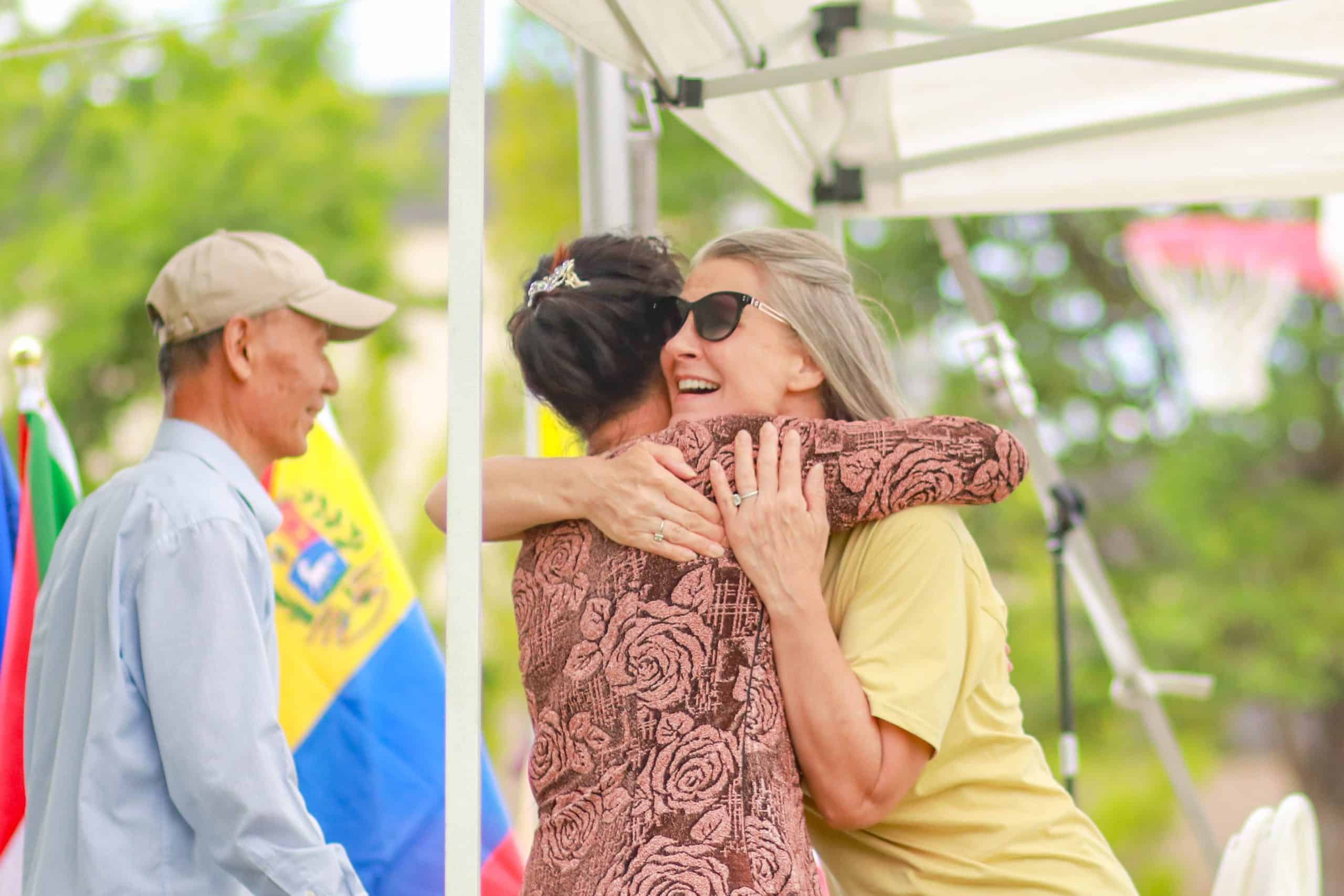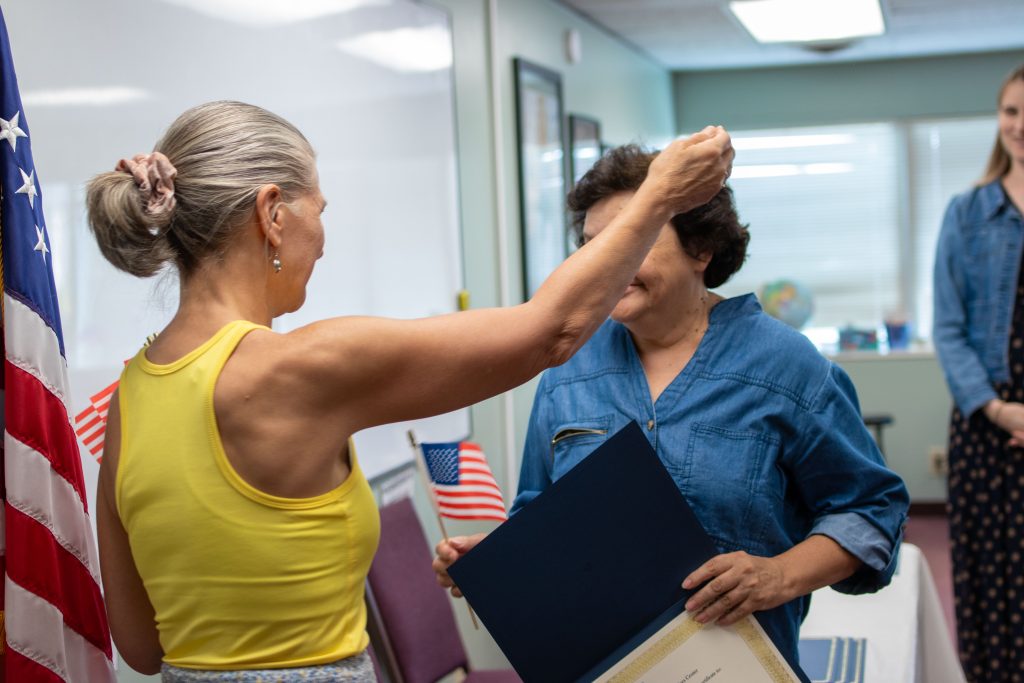By Lisa Zanoni, World Relief Relationship Manager
Friday, August 18th was a beautiful, sunny, and absolutely perfect day. My family was visiting from North Carolina, and I surprised them by taking them on a quick day trip to Montana. We drank huckleberry milkshakes and waded in a clear, cold river.
As we were driving home, I received a text from my daughter. She was clearly unsettled. She wanted to know when I was going to be home because the fires were getting worse, she said. What fires? I thought.
As we got closer to Spokane it was obvious there were fires; the smoke filled the air and our lungs. We continued the rest of the day and evening normally, not really too concerned. Then at 11:30 p.m., we were all startled awake by alerts on our phones. LEAVE NOW!! The panic set in quickly. I got dressed, then just stood in my closet, looking at my clothes and trying to decide what I should pack. All I could think about was getting my cats out safely. One of them hides when she’s afraid. I’m pretty sure I was in shock. I felt as though I was hovering above and observing myself.

I threw some random clothing into an overnight bag. My daughter wrangled one of the cats, and I was calmly guided out of my home and into my car. My husband was able to locate my other kitty and managed to secure her in a suitcase. As we drove down our road, we merged in with the stream of cars of all our neighbors who were evacuating. It felt very much like I was in a movie. What really affected me, though, was all the vehicles moving toward the evacuated area. Trucks pulling horse trailers, and other large vehicles, all headed in the direction of danger in order to assist all those who have livestock. It was terrifying and beautiful at the same time. We were all taken in by family, and I am so grateful for the hospitality we were shown.
One of the side effects of working in this field, working with refugees, is that one never really leaves their work at the office. My mind is always filled with their faces and their stories. Most nights, I fall asleep contemplating ways in which I can get their stories out, or provide awareness, or help our community understand the complications of our staff’s journey in assisting our refugees. Although my life was in chaos, my thoughts still went to them. Not constantly, but it was there, nonetheless, in the back of my mind. Don’t misunderstand. I am not comparing my nightmare with that of a fleeing refugee. What I did experience was overwhelming insight and a shift in perspective. Let me explain.
They can’t go home. I don’t know if most people are aware of this fact. One of the differences between an immigrant and a refugee is that an immigrant who marries a U.S. citizen, or comes here on a work visa and then naturalizes, is able to go home. They can hop on a plane and go visit their family any time they like. Once an immigrant naturalizes, they can even go back home and stay if they like. But a refugee? When they leave their home, they are leaving forever. Going home would mean endangering their own lives, or the lives of the loved ones they left behind. Many of our refugees would be killed immediately upon return to their home country.
All of us have left our homes and belongings behind. But we are still here. We are still doing the best we can.
Josh Meares
I could go home. We live on ten beautiful acres in Chattaroy, and if our house burned to the ground, we could rebuild, and I could go home.
They can’t go home. Not all of our refugees are from remote villages that resemble an Indiana Jones movie. Most of them have cell phones and internet. That technology serves us well, as I experienced when I received the alert on my iphone. I had about 30 minutes to evacuate before the sheriff would knock on our door and make us leave. But what if the alert wasn’t from your phone? What if your alert was insurgents bursting through your door and kidnapping your pre-teen son to force him into the militia? What if your alert was the Taliban sitting on a tank outside your door? What if your alert was being kidnapped from your classroom because you are from the wrong tribe? What if your alert was watching your village burn as you hide in a rowboat along the shore of a river? What if your alert was the police raiding your home during an underground Bible study and jailing all the men? What if your alert was a car bomb on the street outside your front door? What if your alert was your ethnic group being rounded up like cattle, put into trucks and dropped off at the border?
I have so many stories like this. And they are all real. At those moments, decisions are made quickly, without the luxury of any planning. LEAVE NOW! And the unknown and terrifying journey begins. As I mentioned earlier, I think I was in shock. I ponder how our refugees manage to gather their wits, and their courage, to embark on this journey. They arrive at the airport in the U.S. with one suitcase, if they’re lucky. One suitcase, leaving behind a lifetime of memories and family gatherings and births, and way too often, family members.

They can’t go home. I was able to return home after being displaced for three days. I was able to lay my head down on my favorite pillow that conforms perfectly to my head and neck. I had food in my refrigerator. My family photos were intact. Everything I left behind was waiting for me to appreciate on a different level. My entire family, and cats, were all safe. Our primary concern at World Relief is helping our refugees start over. Not just start over, but making sure we give them the tools they need in order to begin their best possible life moving forward. A new home, with food in the fridge, the food they love and miss. A warm bed. Education and job opportunities. Special programs for their children. A loving and welcoming community.
They can’t go home. Teaching citizenship classes to these resilient refugees is the greatest and most rewarding aspect of my work at World Relief. I wish everyone could witness how far they have come in their journeys at this point. About five years have passed when they come to me for instruction. Although I can’t speak into what they are truly dealing with individually, I know what I see. I see beautiful smiles, I see new babies, I see new homeowners, I see successful entrepreneurs in the making, I see proud parents sending their children to college, I see (and hear) English speakers from those who didn’t know one word of English, I see healing, I see persistence, I see overcomers. I see new American citizens. Watching the metamorphosis that happens from Day 1 of their arrival, to Day 1825, is truly remarkable. Fear of an uncertain future that is ahead of them and grief of the life that was stolen, is replaced with joy, hope and peace.
Welcome home.
Please help us make Spokane one of the most welcoming cities on the planet.

